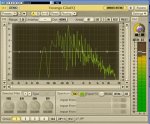P
Peter B
Guest
I've only been home recording for a few months with the ultimate aim of making a demo CD of my sax quartet. I've got a very basics set up comprising a large diaphragm condenser and a ribbon mic plugged into a Lexicon interface working into Cubase LE on a PC. The room I'm in is 18ft x 10ft, lined with book shelves on both 18ft walls and with a wall to wall curtain across one 10ft end. It's pretty dead acoustically.
I've done a few test recordings and I'm gradually getting better recordings as I experiment with mic positions, compression and reverb, but something is really bothering me, and that's why I've signed up here because I'm certain that someone will put me on the right track.
I attach a picture of the master EQ plugin displaying a playback of my quartet. You'll see that it's biassed towards the low frequency end, rolling off rapidly above around 2kHz and this is the case for all the recordings. This is just a snapshot in time, of course, but over the period of a 3 or 4 minute recording the tendancy is definitely to the low frequency end of the spectrum.
I can't understand why the recordings are like this. Is it the mics, the room a or is is just that harmonics generated by 4 saxophones played together tend towards a low frequency mean?
Any thoughts for this nOOby would be very welcome.
I've done a few test recordings and I'm gradually getting better recordings as I experiment with mic positions, compression and reverb, but something is really bothering me, and that's why I've signed up here because I'm certain that someone will put me on the right track.
I attach a picture of the master EQ plugin displaying a playback of my quartet. You'll see that it's biassed towards the low frequency end, rolling off rapidly above around 2kHz and this is the case for all the recordings. This is just a snapshot in time, of course, but over the period of a 3 or 4 minute recording the tendancy is definitely to the low frequency end of the spectrum.
I can't understand why the recordings are like this. Is it the mics, the room a or is is just that harmonics generated by 4 saxophones played together tend towards a low frequency mean?
Any thoughts for this nOOby would be very welcome.


